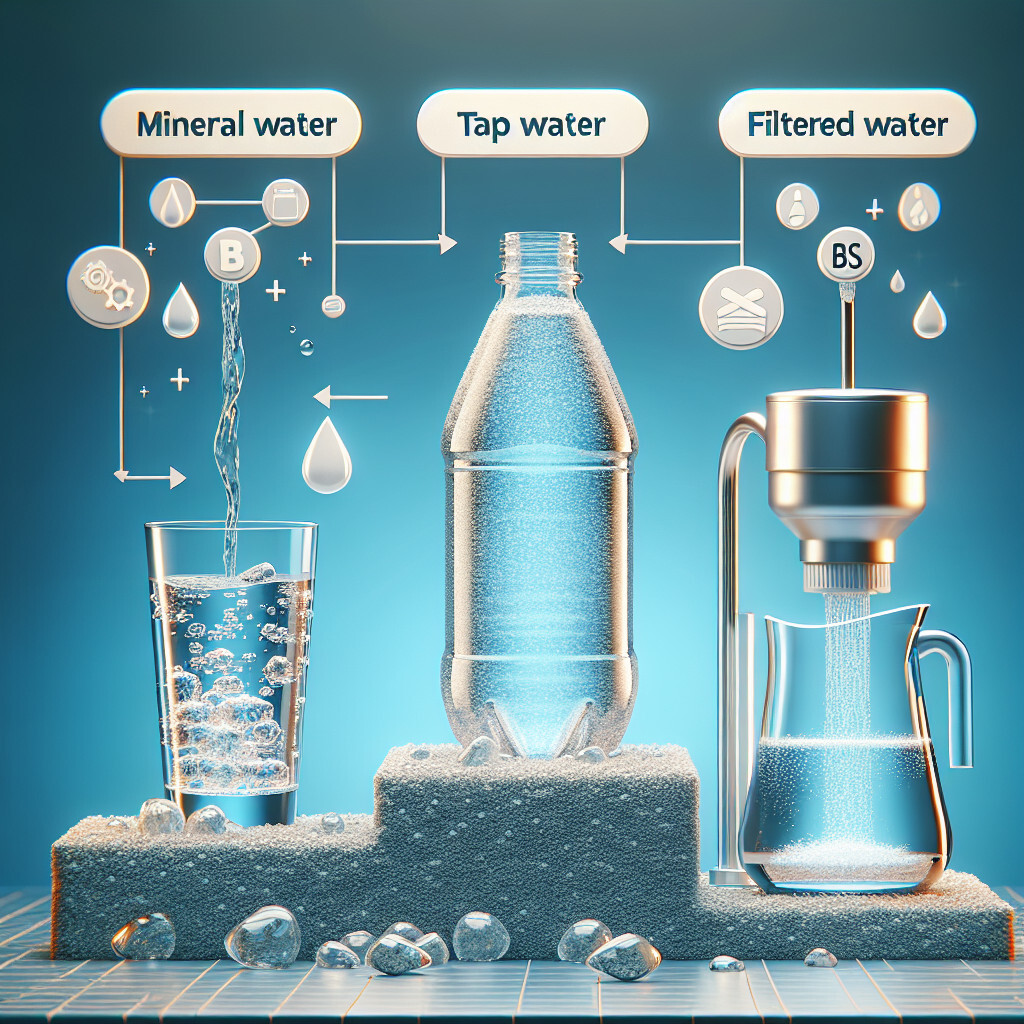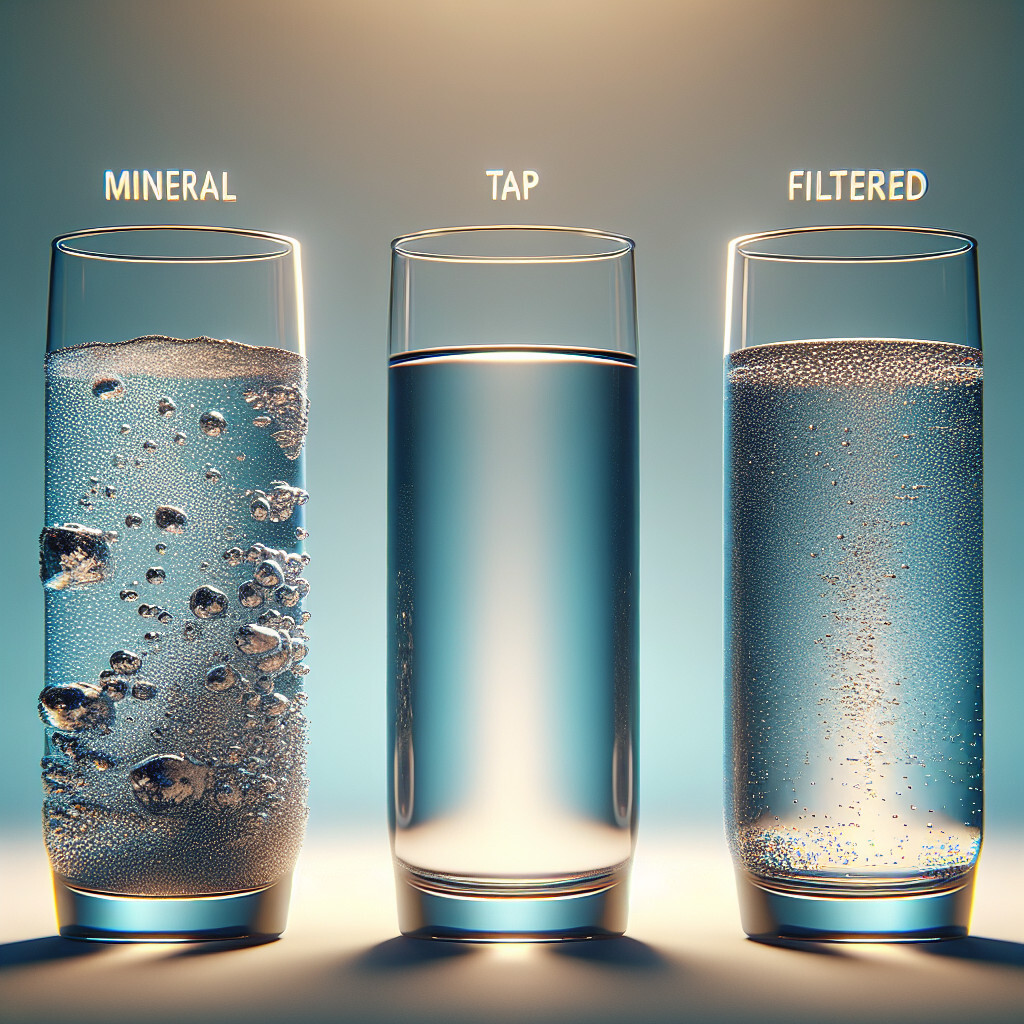-
Table of Contents
- Introduction
- Comparing the Health Benefits: Mineral Water vs. Tap Water
- Understanding the Nutritional Differences: Mineral Water and Filtered Water
- Is Mineral Water the Superior Choice for Hydration?
- The Truth about Mineral Water: Is it Really Better than Tap Water?
- Decoding the Myths: Mineral Water vs. Filtered Water for Daily Consumption
- Q&A
- Conclusion
“Mineral Water: A Natural Boost for Your Health, Beyond Tap and Filtered Water.”
Introduction
Mineral water, tap water, and filtered water all serve the primary purpose of hydration, but they differ in their mineral content and purification processes. Mineral water is often perceived as the healthier option due to its natural mineral and trace element content, which can contribute to daily nutritional intake. However, the quality of tap and filtered water can vary greatly depending on the source and treatment methods. While tap water is easily accessible and cost-effective, it may contain additives like chlorine and fluoride, and potential contaminants. Filtered water, on the other hand, has been processed to remove most impurities, but may also lack beneficial minerals. Therefore, whether mineral water is better for you than tap or filtered water depends on various factors including the quality of the water source, individual health needs, and personal preference.
Comparing the Health Benefits: Mineral Water vs. Tap Water

Mineral water has long been touted as a healthier alternative to regular tap water. But is it really better for you? To answer this question, we need to delve into the specifics of what makes mineral water different from tap water, and whether these differences translate into tangible health benefits.
Mineral water, as the name suggests, contains minerals. These are naturally occurring substances that our bodies need to function properly. Some of the most common minerals found in mineral water include calcium, magnesium, and potassium. These minerals are essential for maintaining healthy bones, regulating blood pressure, and ensuring proper functioning of the nervous system, among other things.
On the other hand, tap water is treated with a variety of chemicals to kill bacteria and other harmful organisms. While this process is necessary to ensure the safety of our drinking water, it can also strip the water of some of its natural minerals. Furthermore, tap water can sometimes contain trace amounts of harmful substances such as lead, especially in areas with older plumbing systems.
So, does this mean that mineral water is inherently healthier than tap water? Not necessarily. While it’s true that mineral water can provide a good source of essential minerals, it’s also important to note that we typically get most of these minerals from our diet. Foods like dairy products, fruits, vegetables, and whole grains are all rich in the minerals that are also found in mineral water. Therefore, if you’re eating a balanced diet, you’re likely getting all the minerals you need without having to rely on mineral water.
Moreover, while tap water can contain trace amounts of harmful substances, it’s also subject to strict safety regulations. In most developed countries, tap water is regularly tested to ensure it meets safety standards. If the water supply in your area is deemed safe, there’s no reason to believe that drinking tap water would be harmful to your health.
Another factor to consider is the environmental impact. Bottled mineral water often comes in plastic bottles, which contribute to pollution and waste. Tap water, on the other hand, requires no packaging and has a much lower environmental footprint.
Lastly, there’s the issue of cost. Bottled mineral water can be significantly more expensive than tap water. If you’re on a tight budget, sticking to tap water can save you a considerable amount of money in the long run.
In conclusion, while mineral water does contain beneficial minerals, it’s not necessarily healthier than tap water. The minerals found in mineral water can also be obtained from a balanced diet, and tap water is subject to strict safety regulations. Furthermore, tap water is more environmentally friendly and cost-effective than bottled mineral water. Therefore, whether you choose to drink mineral water or tap water should depend on your personal preferences, dietary needs, and budget.
Understanding the Nutritional Differences: Mineral Water and Filtered Water
Mineral water has long been touted as a healthier alternative to regular tap or filtered water. But is this claim backed by science, or is it just another marketing gimmick? To answer this question, we need to delve into the nutritional differences between mineral water and filtered water.
Mineral water, as the name suggests, contains a high concentration of minerals. These minerals, including calcium, magnesium, and potassium, are naturally occurring and are absorbed by the water as it flows over rocks and soil. These minerals are essential for our bodies to function properly. For instance, calcium is crucial for bone health, magnesium aids in nerve function, and potassium helps regulate blood pressure. Therefore, drinking mineral water can contribute to your daily intake of these vital nutrients.
On the other hand, filtered water is tap water that has undergone a purification process to remove impurities such as chlorine, lead, and bacteria. While this process ensures the water is safe to drink, it also removes many of the naturally occurring minerals. As a result, filtered water may not provide the same nutritional benefits as mineral water.
However, it’s important to note that the mineral content in mineral water can vary significantly depending on its source. Some brands may contain high levels of certain minerals, while others may have very little. Therefore, if you’re drinking mineral water for its nutritional benefits, it’s essential to check the label to ensure you’re getting what you expect.
Moreover, while mineral water can contribute to your daily mineral intake, it should not be relied upon as your sole source of these nutrients. A balanced diet rich in fruits, vegetables, whole grains, and lean proteins is still the best way to ensure you’re getting all the nutrients your body needs.
Another factor to consider is the environmental impact. Bottled mineral water often comes in plastic bottles, which contribute to plastic pollution. On the other hand, filtered water can be consumed using reusable bottles, making it a more environmentally friendly option.
In terms of taste, many people prefer mineral water because of its crisp, refreshing flavor. This is largely due to the minerals, which can enhance the taste of the water. Filtered water, on the other hand, is often described as tasting “cleaner” or “purer” due to the absence of impurities.
In conclusion, whether mineral water is better for you than filtered water largely depends on your individual needs and preferences. If you’re looking for a water source that can contribute to your daily mineral intake, mineral water may be a good option. However, if you’re more concerned about purity and environmental impact, filtered water may be the better choice. As with most things in nutrition, there’s no one-size-fits-all answer. It’s always best to consider your personal health needs, consult with a healthcare professional if necessary, and make an informed decision that best suits your lifestyle.
Is Mineral Water the Superior Choice for Hydration?
Is mineral water the superior choice for hydration? This question has been a topic of debate among health enthusiasts and experts for quite some time. With the increasing awareness about the importance of hydration and the quality of water we consume, it’s essential to understand the differences between mineral, tap, and filtered water, and their impact on our health.
Mineral water, as the name suggests, is water from a mineral spring that contains various minerals like salts and sulfur compounds. It’s often effervescent due to the presence of dissolved gases. The mineral content in this type of water can vary widely depending on the source, but it typically includes essential minerals like calcium, magnesium, and potassium. These minerals are crucial for maintaining good health, and drinking mineral water can be an easy way to get a good dose of them.
On the other hand, tap water is the most accessible form of water for most people. It’s treated and purified by local water treatment facilities to remove harmful substances and bacteria. However, the quality of tap water can vary greatly depending on the region. In some areas, tap water may contain trace amounts of harmful substances like lead or chlorine. Moreover, while tap water does contain some minerals, the levels are usually lower than those found in mineral water.
Filtered water, meanwhile, is tap water that has undergone additional filtration processes to remove any remaining impurities. The filtration process can vary, with some methods removing not only harmful substances but also beneficial minerals. As a result, while filtered water is often cleaner than tap water, it may not provide the same mineral benefits as mineral water.
So, is mineral water better for you than tap or filtered water? The answer largely depends on your individual needs and circumstances. If you live in an area with high-quality tap water, this can be a perfectly good option for hydration. However, if your tap water quality is questionable, filtered water may be a safer choice.
Mineral water, with its high mineral content, can offer additional health benefits. The calcium and magnesium in mineral water can contribute to bone health, while the potassium can help regulate blood pressure. Moreover, some studies suggest that drinking mineral water can help improve digestion and reduce the risk of heart disease. However, it’s worth noting that mineral water can also be high in sodium, which may not be suitable for those with high blood pressure or kidney problems.
In conclusion, while mineral water can offer certain health benefits due to its mineral content, it’s not necessarily superior to tap or filtered water for hydration. The best choice of water for you depends on various factors, including your local water quality, your health needs, and your personal preferences. Regardless of the type of water you choose, the most important thing is to stay adequately hydrated, as water plays a crucial role in nearly every aspect of our health.
The Truth about Mineral Water: Is it Really Better than Tap Water?
Mineral water has long been touted as a healthier alternative to regular tap or filtered water. But is there any truth to this claim? Let’s delve into the facts and debunk some myths surrounding mineral water.
Mineral water, as the name suggests, contains minerals. These are naturally occurring substances that our bodies need to function properly. Some of the most common minerals found in mineral water include calcium, magnesium, and potassium. These minerals are essential for maintaining healthy bones, regulating blood pressure, and ensuring proper functioning of the nervous system.
On the other hand, tap water is treated with a large number of chemicals to kill bacteria and other microorganisms. While this process is necessary to make the water safe for drinking, it also removes many of the natural minerals. Filtered water, while it may taste better and contain fewer impurities than tap water, also lacks these essential minerals.
So, does this mean that mineral water is better for you than tap or filtered water? Not necessarily. While mineral water does contain essential minerals, the amounts are usually not enough to make a significant difference to your health. For example, you would need to drink several liters of mineral water a day to meet your daily calcium needs – a feat that is not only impractical but could also lead to overhydration.
Moreover, the quality of mineral water can vary greatly depending on the source. Some brands may contain high levels of harmful substances like arsenic or lead. Therefore, it’s important to do your research and choose a reputable brand if you decide to drink mineral water.
It’s also worth noting that while tap water is often demonized for its chemical treatment, it’s actually one of the most regulated substances in the world. In many developed countries, tap water is perfectly safe to drink and contains essential minerals in amounts similar to those found in mineral water.
Filtered water, on the other hand, can be a good compromise between tap and mineral water. While it does remove some minerals, it also gets rid of potentially harmful substances like chlorine and heavy metals. Plus, you can always supplement your diet with mineral-rich foods to make up for any deficiencies.
In conclusion, while mineral water does have some health benefits, it’s not necessarily better for you than tap or filtered water. The best type of water to drink largely depends on your individual needs and circumstances. If you live in an area with poor water quality, mineral or filtered water may be a safer choice. However, if your tap water is safe to drink, there’s no need to spend extra money on bottled water.
Remember, the most important thing is to stay hydrated. Whether you choose to drink mineral, tap, or filtered water, make sure you’re drinking enough each day. After all, water is essential for our bodies to function properly, regardless of its source.
Decoding the Myths: Mineral Water vs. Filtered Water for Daily Consumption
Decoding the myths surrounding the type of water we consume daily can be a daunting task. The debate often centers around mineral water versus filtered water, with each side touting its own set of benefits. But is mineral water really better for you than tap or filtered water? Let’s delve into this topic and separate fact from fiction.
Mineral water, as the name suggests, is rich in minerals such as calcium, magnesium, and potassium. These minerals are essential for the human body and contribute to bone health, heart health, and overall wellness. Moreover, the minerals in mineral water are inorganic, meaning they are more readily absorbed by our bodies compared to the minerals found in food. This is one of the primary reasons why many people prefer mineral water over other types.
On the other hand, filtered water, which can come from tap or bottled sources, has been processed to remove impurities such as bacteria, algae, viruses, fungi, and man-made pollutants that can be harmful to human health. The filtration process also removes minerals, but this doesn’t necessarily mean that filtered water is less healthy. It’s important to remember that a balanced diet can provide all the minerals our bodies need.
However, the quality of filtered water can vary greatly depending on the filtration system used. Some systems are more effective than others at removing harmful contaminants. For instance, activated carbon filters are excellent at removing organic compounds and chlorine, but they may not be as effective at removing heavy metals and microorganisms. On the other hand, reverse osmosis systems can remove a wider range of contaminants, but they also remove beneficial minerals.
So, is mineral water better for you than tap or filtered water? The answer isn’t as straightforward as you might think. It largely depends on your individual dietary needs and the quality of your local tap water. If your diet is already rich in minerals, you might not see much benefit from drinking mineral water. However, if your local tap water is of poor quality, you might be better off drinking filtered or mineral water.
It’s also worth noting that while mineral water can be a good source of minerals, it’s not a magic bullet for health. Drinking mineral water alone won’t make up for a poor diet or lack of exercise. And while filtered water may lack minerals, it’s still a healthy choice, especially if it’s free from harmful contaminants.
In conclusion, both mineral and filtered water have their own set of benefits. Mineral water can provide essential minerals that are readily absorbed by the body, while filtered water can offer a clean, safe source of hydration. The choice between the two ultimately comes down to personal preference and individual health needs. It’s always a good idea to consult with a healthcare professional or a dietitian to determine which type of water is best for you. After all, staying hydrated is key to maintaining good health, regardless of the type of water you choose to drink.
Q&A
1. Question: Is mineral water healthier than tap water?
Answer: Yes, mineral water can be healthier than tap water because it contains essential minerals like calcium, magnesium, and potassium that the body needs.
2. Question: Does mineral water have more benefits than filtered water?
Answer: Yes, mineral water often contains beneficial minerals that may not be present in filtered water, depending on the filtration process used.
3. Question: Can drinking mineral water lead to any health issues?
Answer: Generally, mineral water is safe to drink. However, some brands may contain high levels of sodium, which could be a concern for people with high blood pressure.
4. Question: Is there a significant taste difference between mineral water and tap or filtered water?
Answer: Yes, mineral water often has a distinct taste due to the minerals it contains. The taste of tap or filtered water can vary depending on the source and treatment process.
5. Question: Is it necessary to drink mineral water for a healthy diet?
Answer: No, it’s not necessary to drink mineral water for a healthy diet. While it does contain beneficial minerals, you can also get these nutrients from a balanced diet.
Conclusion
The health benefits of mineral water, tap water, and filtered water can vary greatly depending on the source and treatment process. Mineral water contains natural minerals and salts which can contribute to your daily mineral intake. However, tap and filtered water can also be healthy, especially if the tap water is from a clean source and the filtered water system effectively removes contaminants. Therefore, one is not definitively better than the others; it largely depends on individual health needs and the quality of the water source.







